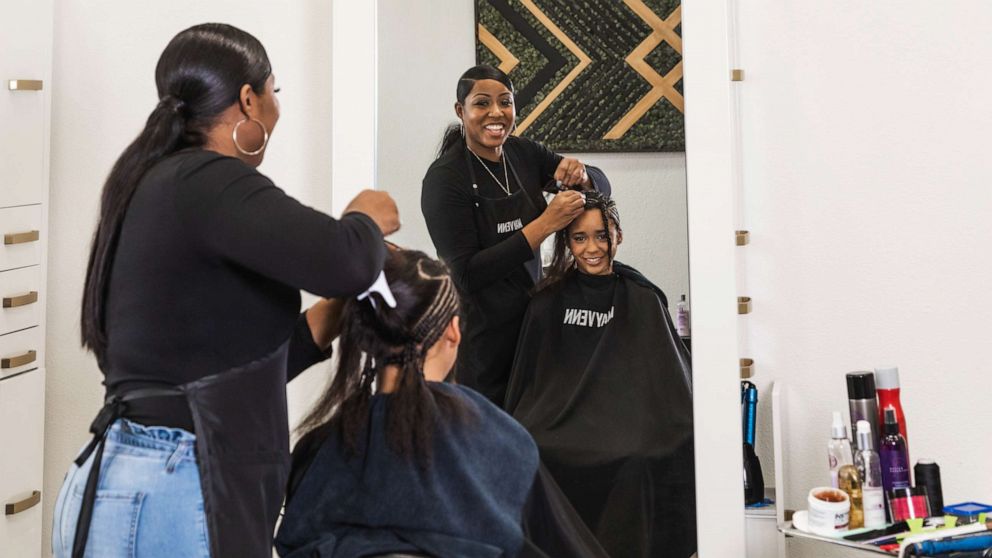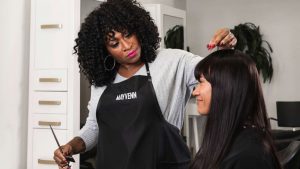African Americans in the hair industry say COVID-19 social distancing is crushing them

One hair extension company is addressing the problem by giving grants.
As the rapid spread of COVID-19 disproportionately devastates black communities across the country, African Americans in the hair care business say stay-at-home orders and social distancing has crushed an industry which relies solely on clientele for a steady income.
“When COVID hit it was like losing my livelihood overnight,” Tiana Brown, 34, owner of That Chics Hair Suite in New Jersey, told ABC News.”I am a full-time stylist. That is my only income.”
According to the Bureau of Labor Statistics, in April the number of unemployed people rose by 15.9 million to 23.1 million. Last week alone 2,438,000 Americans filed for unemployment insurance, according to the U.S. Department of Labor. This brings the nine-week jobless claims total since the coronavirus crisis took hold in the U.S. to approximately 38.6 million people.
Appointment bookings have fallen rapidly in the last few months, and with the future of social distancing guidelines uncertain, hair salons and barbershops within black communities have suffered in unforeseen ways, according to African American hairstylists who were interviewed for this story.
As states begin to reopen their economies, African American hairstylists, who are often classified as freelancers or independent contractors, still face challenges.
Despite the government extending the unemployment benefits of the $2 trillion dollar economic relief bill to gig workers and freelancers, some states have yet to start paying out funds from the new pandemic unemployment assistance program while others scramble to figure out who qualifies.
According to the Small Business Administration, the Paycheck Protection Program (PPP) has provided forgivable loans totaling more than $512 billion to approximately 4.4 million small employers across the country since its launch on April 3. But the funds haven’t reached everyone.
Basketball legend Magic Johnson appeared on ABC’s “Good Morning America” Tuesday to discuss the new program he’s creating to help minority and women-owned businesses. He pledged to give $100 million to the businesses struggling to get PPP.
Some stylists told ABC News that they have been without income for at least seven weeks.
Whitney Spencer, owner of Crown Salon Studio in Little Rock, Arkansas, said the process of applying for loans and unemployment is “confusing, slow and unreliable.” After applying for unemployment and loans in March, she has yet to receive any money. “This pandemic is crippling to us African American stylists who were built to hustle,” she said.
Hairstylists told ABC they often rely on tips from their clients to balance out their income.
“It’s been a financial adjustment, what I receive in unemployment for a week, I can make in a day or two,” said Signature Image Salon hairstylist and colorist, Cierra Curenton, who works in Washington, D.C. “I’m single, so I have no one to help carry the financial burden.”
To help the black hair business stay afloat, some major companies have partnered to provide financial relief.
Mayvenn hair extension company CEO, Diishan Imira, decided to start a GoFundMe to help get money back in hairstylists pockets.
“It feels good to be able to do something when helplessness consumes our world right now,” Imira told ABC News. “Black salons and barbers are the backbone for black entrepreneurship and an integral part of our communities.”
Mayvenn hair company has gotten together with financial partners to raise money that they say goes straight into the bank accounts of stylists who use their products and are unable to work. So far they say they’ve handed out almost $1.3 million with a goal of $2 million by June.
Recipients of the funds like stylists Whitney Spencer and Makayla King have been thankful.

A woman gets her hair done inside a hair salon in Oakland, CA. Mayvenn
Spencer was relieved to see the standard $500 deposited directly into her bank account. “I dropped down to my knees. … I am receiving more help from Mayvenn than my own government,” she told ABC News.
Having still not received any unemployment benefits, Spencer says she spends her socially distanced days personally delivering professional hair products to the doorsteps of her clients, holding virtual hair appointments and making short TikTok hairstyle videos to keep up her clientele. “All I know is hustle,” she said.
Makayla King, another Mayvenn recipient, must come up with $1,400 by June to pay her booth rent at the salon for the past two months. After receiving the money from Mayvenn, she said some strain was taken off her.
Despite support from companies like Mayvenn, stylists at some small salons say they may not survive the pandemic.
Signature Image Salon stylist Cierra, fears for the financial burden that it places on the owner to keep her shop open. “Even after this is over, playing catch up could be hard for us,” she told ABC News. “We have to learn a new way to do business, and quickly.”
Some stylists say they are trying to remain optimistic.
“I would love to see people transitioning back into the salon,” Shaleea Womack said.
Womack, 52, owner of Head Over Heels by Shaleea in New Jersey is preparing for the changes that will come once her salon opens back up. “Clients can expect major sanitary procedures we learned in cosmetology school to be the 2.0 version on steroids,” she said.